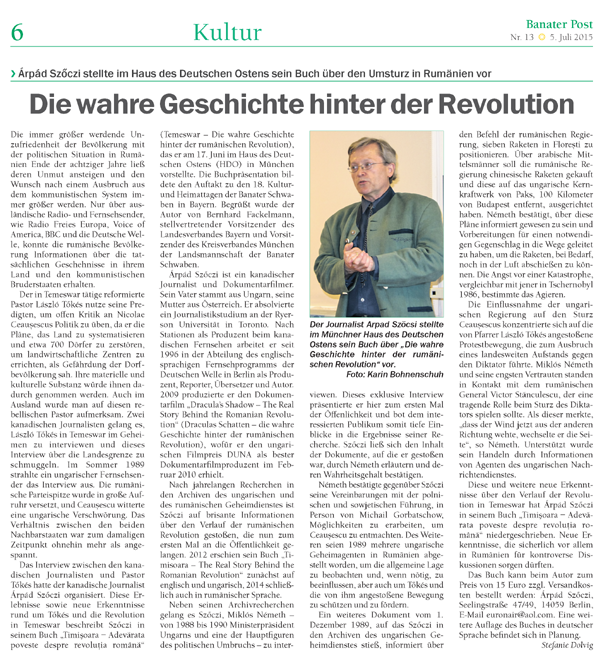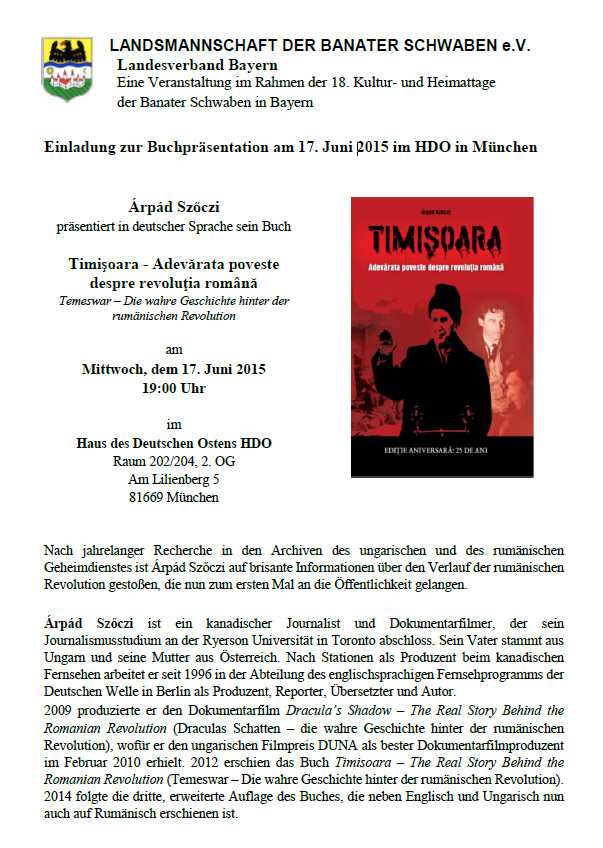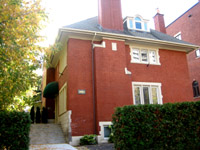Die wahre Geschichte hinter der Revolution
 |
Einladung zur Buchpräsentation am 17. Juni 2015 im HDO in München
 |
Zum ersten Mal wird das rumänische Buch Timişoara - Adevărata poveste despre revoluţia română in Rumänien vorgestellt!
02.06.2015
 |
Wo: Adam-Müller-Guttenbrunn-Haus, Str. Gheorghe Lazar 10-12, 300080 Temeswar. Tel: 00-40-256 499614.
Wann: Am Mittwoch, dem 3. Juni, 2015 um 15 Uhr.
Bücher werden vorhanden sein. Der Autor beantwortet gerne Fragen vom Publikum.
Die bisher unbekannten Hintergründe der rumänischen Revolution
12.12.2014
 |
Pressekonferenz und Buchvorstellung in Budapest
Sajtóház (MÚOSZ Székház),
1064 Budapest
Vörösmarty u. 47/A
am Montag, den 15. Februar 2015, um 15.30 Uhr.
Als Ehrengäste werden László Tőkés sowie die zwei kanadischen Journalisten Michel Clair und Réjean Roy anwesend sein, die ein geheimes Fernsehinterview mit Tokés führten, das erstmals am 24. Juli 1989 in der TV-Sendung Panoráma ausgestrahlt wurde.
Die Veranstaltung findet auf Englisch und Ungarisch statt.
Sollten Sie weitere Informationen benötigen, rufen Sie bitte den Autor direkt an. Tel.: +49-172-323 4159.
* * *
 |
The Montreal Break-In in 1985
(The following is an excerpt from the upcoming book on the Romanian Revolution by Árpád Szőczi. This part deals with the North American NGO Group, the HHRF - Hungarian Human Rights Foundation - which tried to publicize the situation in Romania to the West during the dictatorship of Nicolae Ceausescu. The following incident occurred in 1985 when two members of the group broke into the Romanian Consulate in Montreal. The English- and Hungarian-language versions of the book will be released on Sat., Nov. 3, 2012. The Romanian-language version will be released on Dec. 15, 2012. Please check back to this page on Oct. 15 for updates on where you can buy or order the book. It will be available around the world, including on Amazon.com.)
The building where the former Romanian consulate was |
The anecdote was that there was indeed a security guard in the building but he was scared and locked himself in a closet.
The two young men then basically filled up their car with documents "and anything else we could get our hands on, but nothing of commercial value", explained Megyeri who now lives in Budapest, "except for a carpet that we rolled up most of the goods in.".
"We also found a brown-lacquered box that had a padlock on it as well as the symbol for radioactivity. That we also took."
The pair then left and as they started up their car which they had parked right in front of the consulate the security guard crept out and wrote down their licence plate number. It's now about 3 a.m. and they then went to Stephen's home, rang his doorbell, and a very surprised host opened the door.
"They showed me what they had, including the box with the radioactive symbol on it, and I just said, 'Jesus, what did you do?'"
They then told him and he reluctantly agreed to let them store the stolen goods in his garage for the time being.
They then went home and slept it off.
And on that Sunday they had things to do. So did the police.
The first to get caught was J. G. On Sunday morning he had gone out for a short walk. By the time he came back home his apartment was full of police who demanded to know where the consulate's goods were. J. G. struck a deal - if he were to tell them then they wouldn't arrest him. They agreed. He told them.
And then they arrested him.
Next stop: Megyeri's home.
He had just come back from Stephen's place where they discussed what had happened. He lived at his father's and as he approached the apartment he saw that the door was open and the home was swarming with police who were taking the place apart. J. G. was sitting in the living room in handcuffs.
The detective at the scene then approached.
"Are you G. Megyeri?", he asked.
"Yes."
"And do you know why we're here?"
"I have a pretty good idea."
Megyeri says that the detective wanted to know his version of where the stolen goods were. He asked to talk to the detective outside and struck a deal.
"I asked him that we should do this in a civilized way. I told him to stop the search because the stuff's not there. I asked him to take the handcuffs off of J. G., and I asked him to let us go and we would return the stuff in an hour. He agreed. He told me to bring everything to the police station. He also said there are two ways this can go down - one, that this was simply a student prank; or two, that this was a break-and-enter offence.
"Which one do you want?" asked the detective.
"The first one, obviously," said Megyeri.
The two were indeed let go, returned the goods to the police station, where Megyeri was interrogated.
"The detective went back a little on his word with me. They pressed charges."
This is when the protestant minister of the Hungarian church in Montreal, Aladár Komjáthy, the same man who befriended Stephen when he first came to Montreal, intervened. It had been suggested in the community that Komjáthy, an American citizen, had secret service contacts. He certainly had pull with the police and found out from them that none of the stolen goods were immediately returned to the Romanians. Instead, they were examined - especially the box with the radioactive logo on it. And when the box was opened they found it full of - condoms.
Condoms were illegal in Romania at the time and hence had a high black market value.
And so Komjáthy and the pair's lawyer made it crystal clear that should this become a full court case they will talk about the contents of the "radioactive" box.
It never went to full trial and became a plea bargain instead. The pair was given a choice of spending half-a-day in jail or taking a two-year suspended sentence. They chose the latter because, as Megyeri said, "We didn't want to spend a single minute in jail."
The Romanian consulate also got a lot better security system.





